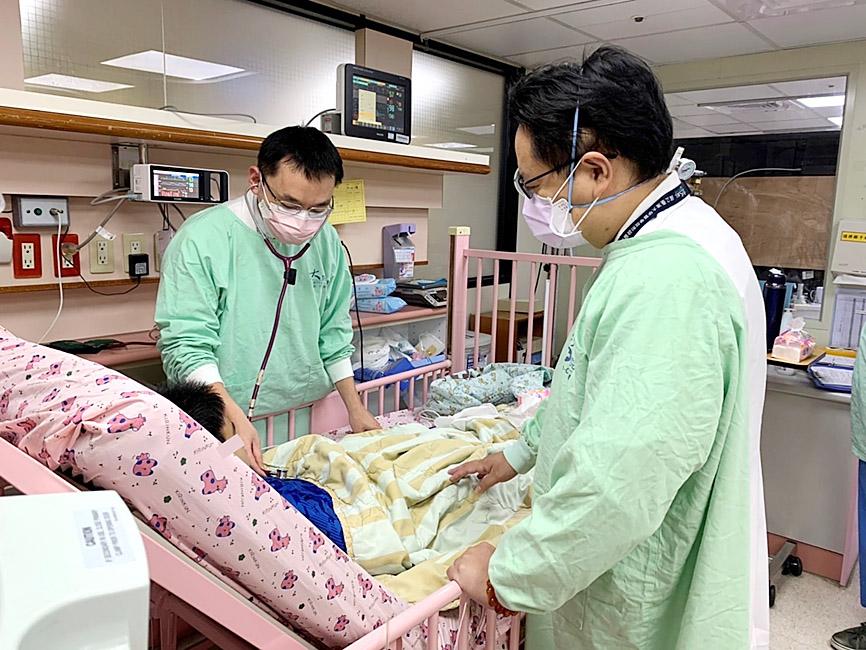Thirty-seven percent of children and adolescents hospitalized with COVID-19 had neurological symptoms, a study conducted by National Taiwan University Hospital (NTUH) found.
Two of them had a stroke after developing encephalitis, the hospital told a news conference on Friday morning to promote COVID-19 vaccinations for children.
NTUH Department of Pediatrics director Lee Wang-tso (李旺祚) said the hospital worked with more than a dozen other hospitals to established a reporting system for people aged 18 or younger who were diagnosed with COVID-19.

Photo courtesy of the National Taiwan University Hospital via CNA
Among the 1,163 cases in its database, 404 were hospitalized, 148 of whom, or 37 percent, exhibited neurological symptoms, including 13 cases, or 9 percent, with suspected or confirmed encephalitis, he said.
Of the 13 juvenile cases, two had a stroke, Lee said, adding that they recovered after treatment.
One of them is a 12-year-old boy who developed weakness in the right leg and a fever after he was diagnosed with COVID-19, Lee said, adding that pathological changes were found in his blood vessels, the left side of his brain and his right frontal lobe.
The boy’s limb weakness improved after treatment, he said.
The other case is an eight-year-old boy, who developed a fever, convulsions and abnormal liver function after being diagnosed with COVID-19, he said.
The child developed inflamation and local ischemia, and pathological changes were found in his blood vessels, Lee said.
The boy recovered after receiving intravenous immunoglobulin and remdesivir, and was discharged from hospital, he added.
Lee said the data showed that the risk children infected with the Omicron variant of SARS-CoV-2 develop encephalitis or encephalitis-like symptoms is nearly 10 times higher than for children infected with the initial variants of the virus.
Although children who have the disease rarely have a stroke, pathological changes in their blood vessels pose an increased risk that should not be neglected.
Nearly half of the cases examined using magnetic resonance spectroscopy showed cerebral vascular changes, Lee said.
Children are also at risk of developing multisystem inflammatory syndrome in children (MIS-C) after recovering from acute COVID-19, he said, adding that this risk should not be neglected either.
Department deputy director Chang Luan-yin (張鑾英) said that most of the cases in the database were unvaccinated.
However, as the vaccination rate among children aged five to 11 has increased, fewer cases have been reported, Chang added.
National Taiwan University Children’s Hospital superintendent Huang Li-min (黃立民) said that vaccination is the most important way to prevent severe COVID-19 complications and MIS-C, so the hospital encourages parents to bring their children to get vaccinated as early as possible.
Additional reporting by CNA

Conflict with Taiwan could leave China with “massive economic disruption, catastrophic military losses, significant social unrest, and devastating sanctions,” a US think tank said in a report released on Monday. The German Marshall Fund released a report titled If China Attacks Taiwan: The Consequences for China of “Minor Conflict” and “Major War” Scenarios. The report details the “massive” economic, military, social and international costs to China in the event of a minor conflict or major war with Taiwan, estimating that the Chinese People’s Liberation Army (PLA) could sustain losses of more than half of its active-duty ground forces, including 100,000 troops. Understanding Chinese

The Ministry of Foreign Affairs (MOFA) yesterday said it is closely monitoring developments in Venezuela, and would continue to cooperate with democratic allies and work together for regional and global security, stability, and prosperity. The remarks came after the US on Saturday launched a series of airstrikes in Venezuela and kidnapped Venezuelan President Nicolas Maduro, who was later flown to New York along with his wife. The pair face US charges related to drug trafficking and alleged cooperation with gangs designated as terrorist organizations. Maduro has denied the allegations. The ministry said that it is closely monitoring the political and economic situation

UNRELENTING: China attempted cyberattacks on Taiwan’s critical infrastructure 2.63 million times per day last year, up from 1.23 million in 2023, the NSB said China’s cyberarmy has long engaged in cyberattacks against Taiwan’s critical infrastructure, employing diverse and evolving tactics, the National Security Bureau (NSB) said yesterday, adding that cyberattacks on critical energy infrastructure last year increased 10-fold compared with the previous year. The NSB yesterday released a report titled Analysis on China’s Cyber Threats to Taiwan’s Critical Infrastructure in 2025, outlining the number of cyberattacks, major tactics and hacker groups. Taiwan’s national intelligence community identified a large number of cybersecurity incidents last year, the bureau said in a statement. China’s cyberarmy last year launched an average of 2.63 million intrusion attempts per day targeting Taiwan’s critical

AGING: As of last month, people aged 65 or older accounted for 20.06 percent of the total population and the number of couples who got married fell by 18,685 from 2024 Taiwan has surpassed South Korea as the country least willing to have children, with an annual crude birthrate of 4.62 per 1,000 people, Ministry of the Interior data showed yesterday. The nation was previously ranked the second-lowest country in terms of total fertility rate, or the average number of children a woman has in her lifetime. However, South Korea’s fertility rate began to recover from 2023, with total fertility rate rising from 0.72 and estimated to reach 0.82 to 0.85 by last year, and the crude birthrate projected at 6.7 per 1,000 people. Japan’s crude birthrate was projected to fall below six,